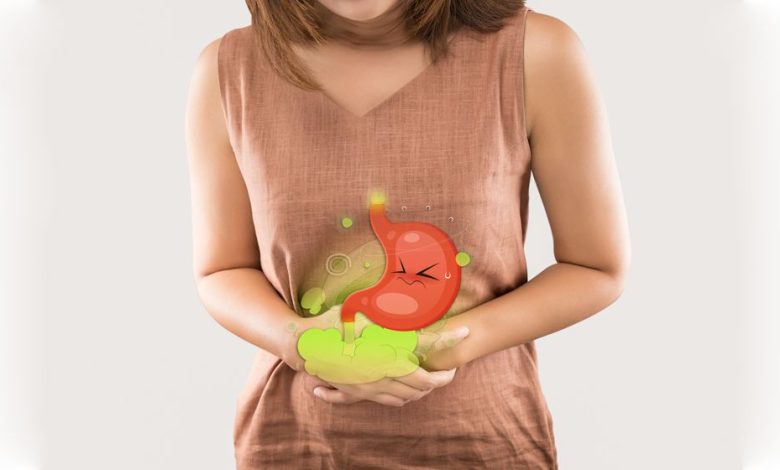Borborygmas or rumbling in the abdomen: What's it, symptoms, diagnostics, treatment, prevention

Synonyms: Sounds in the stomach; Collywobbles; Is it central?
Abdominal sounds; Bowel sounds
What is rumbling in the stomach
Collywobbles (Is it central?) may be a natural reaction of the body, may be indicative of health problems.. Sounds, occurring in the abdomen, may have different reasons, but they are all related to the process of digestion.
Rumbling in the abdomen occurs during bowel movements, when he pushes food. The intestines are hollow, therefore, bowel sounds echo in the abdominal cavity and are very similar to sounds, emitted by water pipes.
Most bowel sounds are normal. They simply testify to the work of the gastrointestinal tract.. The doctor may check for abdominal sounds, listening to the abdomen with a stethoscope (auscultation).
Most bowel sounds are harmless.. However, in some cases, abnormal sounds may indicate a problem or medical condition..
Ileus – It is a violation of the food bolus promotion kishechniku, that can be provoked by various factors – squeezing, bowel spasm or hemodynamic disorder. This problem can lead to gas buildup, intestinal fluid and contents and rupture of the intestinal wall. The doctor may not be able to hear any bowel sounds when listening to the abdomen.
Reduction (gipoaktivnostь) bowel sounds include lowering the volume, tone or regularity of sounds. They are a sign of, that bowel activity has slowed down.
Hypoactive bowel sounds are normal during sleep. They also occur within a short time after the use of certain drugs and after abdominal surgery.. Decreased or absent bowel sounds often indicate constipation.
Gain (hyperactivity) bowel sounds can sometimes be heard even without a stethoscope. Hyperactive Gut Sounds Mean Increased Intestinal Activity. It can happen with diarrhea or after eating..
Abdominal sounds are always evaluated along with such symptoms., as:
- Gas formation
- Nausea
- Presence or absence of defecation
- Vomiting
If bowel sounds are hypoactive or hyperactive and there are other abnormal symptoms, you should seek medical advice.
For Example, absence of bowel sounds after a period of hyperactive bowel sounds may mean bowel rupture or strangulation and death (necrosis) intestinal tissue.
Very high bowel sounds may be a sign of early bowel obstruction..
Causes of rumbling in the stomach
Most sounds, that you hear in your stomach and intestines, associated with normal digestion. They are not a cause for concern. Many conditions can cause overactive or hypoactive bowel sounds. Most of them are harmless and do not need treatment..
Below is a list of more serious conditions, which can cause abnormal bowel sounds.
- Hyperactive, hypoactive or absent bowel sounds can be caused by::
- Clogged blood vessels interfere with normal blood flow in the intestines. For Example, blood clots can cause mesenteric artery occlusion.
- Mechanical bowel obstruction, which is caused by a hernia, tumor, adhesions or similar conditions, which can block the intestines.
- Paralytic ileus is a nerve problem, leading to the intestines.
Other causes of hypoactive bowel sounds include:
- Preparations, slow down peristalsis, such as opiates (including codeine), anticholinergics and phenothiazines.
- General anesthesia
- Irradiation of the abdomen
- Spinalynaya anesthesia
- Surgery in the abdomen
- Other causes of hyperactive bowel sounds include:
- Crohn's Disease
- Diarrhea
- Alimentary allergy
- Gastrointestinal bleeding
- Infectious enteritis
- Yazvennыy colitis
When to see a doctor for a rumbling stomach
Call your doctor, if you have any of the following symptoms:
- Bleeding from the rectum
- Nausea
- Diarrhea or constipation, that go on for a long time
- Vomiting
What will the doctor do when diagnosing the causes of rumbling in the abdomen
A healthcare professional will examine you and ask questions about your medical history and symptoms. You may be asked:
- What other symptoms do you have?
- Do you have stomach pains?
- You have diarrhea or constipation?
- you have bloating?
- Do you have excess or absent gas (flatus)?
- Do you notice rectal bleeding or black stools??
You may need the following tests:
- CT of the abdomen
- X-ray of the abdomen
- Blood tests
- Endoscopy
If there are signs, requiring emergency hospitalization, you will be sent to the hospital. In most cases, you will not be allowed to eat or drink anything., so your intestines can rest. You will be given fluids through a vein (intravenously).
You may be given medicine to reduce the symptoms of rumbling in the stomach and treat the cause of the problem.. The type of medication prescribed will depend on the cause.. Some people may need emergency surgery.
Sources
- Ball JW, Dains JE, Flynn JA, Solomon BS, Stewart RW. Abdomen. In: Ball JW, Dains JE, Flynn JA, Solomon BS, Stewart RW, eds. Seidel’s Guide to Physical Examination. 9th ed. St Louis, MO: Elsevier; 2019:chap 18.
- Landmann A, Bonds M, Postier R. Acute abdomen. In: Townsend CM Jr, Beauchamp RD, Evers BM, Mattox KL, eds. Sabiston Textbook of Surgery. 21st ed. St Louis, MO: Elsevier; 2022:chap 46.
- McQuaid KR. Approach to the patient with gastrointestinal disease. In: Goldman L, Schafer AI, eds. Goldman-Cecil Medicine. 26th ed. Philadelphia, PA: Elsevier; 2020:chap 123.
